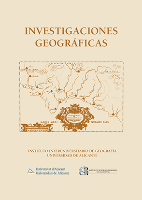
Investigaciones Geograficas-Spain
metrics 2024
Unveiling the complexities of our planet through rigorous research.
Introduction
Investigaciones Geográficas-Spain is an esteemed academic journal published by the Universidad de Alicante, dedicated to advancing the fields of geography, planning, and development as well as earth and planetary sciences. With its commitment to open access since 1983, the journal ensures that research is readily available to a global audience, facilitating knowledge dissemination and collaborative discourse. As reflected in its 2023 Scopus rankings, it holds a commendable position within the Q3 category in both Earth and Planetary Sciences and Geography, Planning and Development, making it a noteworthy resource for scholars and practitioners in these disciplines. The journal's scope encompasses diverse geographical research, aiming to address pressing environmental and societal challenges through empirical studies and theoretical advancements. By contributing to the knowledge reservoir from Spain and beyond, Investigaciones Geográficas-Spain serves as a vital platform for researchers, professionals, and students seeking to enrich their understanding of geographical phenomena.
Metrics 2024
 0.29
0.29 0.50
0.50 0.60
0.60 9
9Metrics History
Rank 2024
Scopus
IF (Web Of Science)
JCI (Web Of Science)
Quartile History
Similar Journals
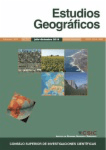
Estudios Geograficos
Shaping Insights, Influencing PoliciesEstudios Geograficos, a prominent journal published by the CONSEJO SUPERIOR INVESTIGACIONES CIENTIFICAS-CSIC in Spain, serves as a vital platform for advancing the fields of geography and earth-surface processes. With an ISSN of 0014-1496 and E-ISSN of 1988-8546, the journal has been committed to Open Access since 1996, ensuring that its valuable research is accessible to a global audience. Recognized as a Q3 journal in both Earth-Surface Processes and Geography, Planning and Development, it plays a crucial role in shaping understanding and policy related to our planet. As of 2023, it holds a respectable rank of 562nd in Social Sciences Geography and maintains a percentile standing, reflecting its significance within the academic community. Covering a diverse range of topics, Estudios Geograficos aims to foster scholarly dialogue and disseminate innovative interdisciplinary findings, providing researchers, professionals, and students with critical insights and tools to address contemporary geographic challenges.

GEOJOURNAL
Navigating the Future of Environmental ManagementGEOJOURNAL, published by SPRINGER, is a distinguished academic journal that occupies a pivotal role in the fields of geography, planning, and development. With a robust ISSN of 0343-2521 and an E-ISSN of 1572-9893, it has been a cornerstone of scholarly communication since its inception in 1977. Operating from the Netherlands, GEOJOURNAL offers insightful research articles that delve into the dynamics of spatial analysis, environmental management, urban studies, and regional development, thus catering to a diverse readership of researchers, professionals, and students alike. The journal boasts an impressive Scopus ranking of #176 out of 821 in its category, positioning it in the top 22% percentile while maintaining a Q2 quartile ranking in Geography, Planning, and Development as of 2023. With access options available, GEOJOURNAL remains a vital platform for disseminating cutting-edge research and fostering academic collaboration, indispensable for those engaging with contemporary geographic challenges and innovative solutions. Engage with GEOJOURNAL to enrich your understanding and contribute to critical discussions in this ever-evolving field.
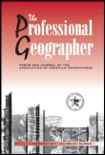
PROFESSIONAL GEOGRAPHER
Fostering Innovation in Geography and Earth-Surface ResearchPROFESSIONAL GEOGRAPHER is a prominent journal in the fields of geography and earth-surface processes, published by Routledge Journals, Taylor & Francis Ltd. With a rich history dating back to 1949 and continuing through 2024, it serves as a vital platform for researchers, professionals, and students to explore and disseminate groundbreaking research and insights within the geographical sciences. The journal holds a respectable impact factor, placing it in the Q2 quartile for both Earth-Surface Processes and Geography, Planning and Development as of 2023, highlighting its importance in these critical academic areas. The journal ranks #273 out of 821 in Geography and Planning and #70 out of 179 in Earth and Planetary Sciences on Scopus, reflecting its robust contribution to advancing knowledge in social sciences. Although it does not currently offer open access options, it still provides invaluable content that influences pedagogy and research in geography. Its comprehensive scope invites a wide range of geospatial topics, encouraging interdisciplinary dialogue and collaboration across the global academic community.

Cadernos de Geografia
Connecting Global Perspectives through Open Access GeographyCadernos de Geografia is a distinguished biannual journal published by UNIVERSIDADE DE COIMBRA, FACULDADE DE LETRAS, dedicated to the field of geography and related social sciences. With its ISSN 0871-1623 and E-ISSN 2183-4016, this journal has been a prominent platform for the dissemination of high-quality research since it became open access in 2012. Situated in Coimbra, Portugal, it aims to foster academic excellence by providing an inclusive space for innovative studies that explore contemporary geographical issues. Cadernos de Geografia encourages submissions that address diverse aspects of geography, ranging from environmental studies to urban planning, making it an invaluable resource for researchers, professionals, and students alike. As a part of the growing trend in open-access publishing, it enhances the global reach and accessibility of geographical research, thereby contributing to the enrichment of knowledge in the field.

Journal of Geology Geography and Geoecology
Exploring the Interconnections of Earth Sciences.The Journal of Geology Geography and Geoecology, published by OLES GONCHAR DNIPRO NATIONAL UNIVERSITY, is a premier open-access platform dedicated to advancing the fields of geology, geography, and geoecology. With its ISSN 2617-2909 and E-ISSN 2617-2119, this journal seeks to disseminate high-quality research, fostering collaboration and innovation among researchers, professionals, and students alike. The journal embraces a diverse range of topics, from earth sciences and ecological studies to geographical methodologies, providing a comprehensive perspective on how these disciplines interconnect. It aims to support impactful scholarly communication, thereby addressing some of the most pressing environmental challenges of our time. Authors and readers will find a committed editorial team that values rigorous peer-review processes and encourages the rapid sharing of scientific knowledge, all while maintaining a commitment to open access principles. This makes the Journal of Geology Geography and Geoecology an essential resource for anyone invested in understanding the complex dynamics of our planet.

Geoadria
Connecting Researchers in Geography and DemographyGeoadria, an esteemed Open Access journal published by the University of Zadar in Croatia, has been at the forefront of disseminating valuable research since its inception in 1996. With a keen focus on atmospheric science, demography, earth-surface processes, and geography, this journal serves as a crucial platform for researchers and professionals aiming to explore the intricate relationships between these fields. Although it currently holds a Q4 quartile ranking in various categories, such as Atmospheric Science and Geography, its commitment to promoting innovative scholarly dialogue ensures its relevance and utility within the academic community. Geoadria is indexed in Scopus, with rankings that reflect its ongoing contribution to the social sciences and earth sciences, notably garnering attention in niche areas. With a dedication to open access since 1996, the journal stands as a testament to the University of Zadar's commitment to enhancing global knowledge. Researchers, professionals, and students interested in geography, demography, and environmental sciences will find Geoadria a vital resource for the latest empirical studies and theoretical discussions.
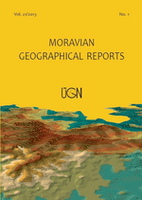
Moravian Geographical Reports
Advancing Earth Sciences through Open Access KnowledgeWelcome to the Moravian Geographical Reports, an esteemed Open Access journal published by SCIENDO, dedicated to advancing the fields of Earth and Planetary Sciences as well as Geography, Planning and Development. Established in 1993, this journal has steadily built a reputation for disseminating high-quality research, evidenced by its 2023 Q2 ranking in both relevant categories and an impressive Scopus percentile ranking of 72. With a dedicated editorial board and an expanding global readership, the Moravian Geographical Reports serves as a vital platform for researchers, professionals, and students alike, fostering dialogue and collaboration across various dimensions of geographical and environmental studies. Since its shift to Open Access in 2013, it has significantly enhanced the accessibility and reach of its published works, making crucial research findings available to a broader audience. The journal continues to thrive as a significant contributor to the geographical and earth sciences discourse during its converged years from 1993 to 2024.
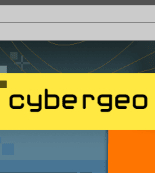
CyberGeo-European Journal of Geography
Pioneering Critical Insights in European GeographyCyberGeo-European Journal of Geography, published by CYBERGEO, is a leading open-access journal that has been at the forefront of geographical research since its inception in 1996. With a dedicated focus on the multifaceted dimensions of geography, the journal aims to disseminate innovative and critical insights into geographical phenomena in Europe and beyond. The journal has established itself in the academic community, currently holding the Q3 quartile ranking in the Social Sciences (miscellaneous) category for 2023 and recognized within Scopus as #428 out of 604, placing it in the 29th percentile. CyberGeo publishes original research articles, thematic issues, and reviews that contribute to the advancement of geographical knowledge, making it an essential resource for researchers, professionals, and students alike. Situated in Paris, France, the journal embraces a truly international perspective and invites contributions that stimulate scholarly debate and further the understanding of spatial dynamics. By providing open access to its content, CyberGeo ensures that its research is accessible to a global audience, promoting knowledge sharing and collaborative exploration in the field of geography.
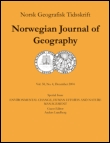
Norsk Geografisk Tidsskrift-Norwegian Journal of Geography
Fostering dialogue on pressing geographical challenges.Norsk Geografisk Tidsskrift-Norwegian Journal of Geography, published by Routledge Journals, Taylor & Francis Ltd, is a pivotal peer-reviewed journal that has been instrumental in advancing the field of geography since its inception in 1926. With an esteemed Q2 ranking in both Earth and Planetary Sciences and Geography, Planning and Development categories, it serves as a vital resource for researchers, professionals, and students seeking to deepen their understanding of geographical phenomena. The journal's rich historical archive, covering significant periods in geography and environmental studies, showcases a diverse array of articles that reflect ongoing research trends and challenges within the field. Despite not offering Open Access, its impactful content remains accessible through institutional subscriptions, underscoring the journal's commitment to advancing geographical research and fostering scholarly dialogue. As it continues to publish high-quality research, Norsk Geografisk Tidsskrift stands as a key player in geographical scholarship, reinforcing its importance within the academic community.
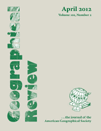
GEOGRAPHICAL REVIEW
Transforming Perspectives on Spatial and Environmental ChallengesGEOGRAPHICAL REVIEW, published by Taylor & Francis Inc, is a premier academic journal recognized for its influential contributions to the fields of geography and earth-surface processes. With an ISSN of 0016-7428 and an E-ISSN of 1931-0846, this journal has established itself as a vital resource for researchers, professionals, and students alike. The journal maintains a strong reputation with a Q1 ranking in both Earth-Surface Processes and Geography, Planning and Development, reflecting its scholarly impact and relevance in the academic community. Additionally, it holds a notable position in Scopus rankings, placing #181 out of 821 in Social Sciences and #45 out of 179 in Earth and Planetary Sciences. Although it is not open access, the GEOGRAPHICAL REVIEW remains essential for those seeking to expand their understanding of spatial analysis and environmental processes from its historical inception in 1969 to its ongoing publications through 2024. Explore rigorous research articles, critical reviews, and innovative studies that shape the discourse in geography and earth sciences today.